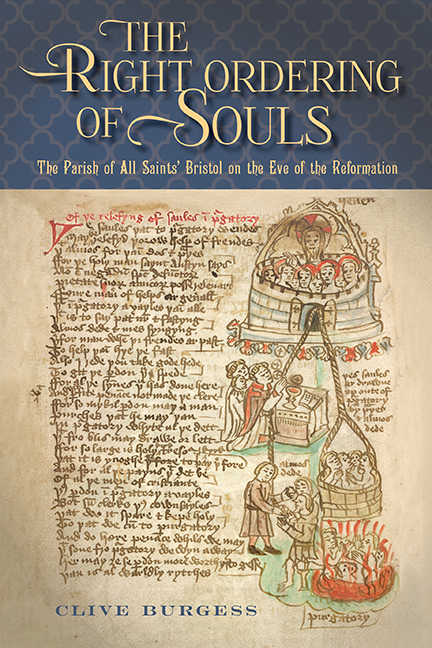Book contents
- Frontmatter
- Dedication
- Contents
- List of illustrations
- Acknowledgements
- Miscellaneous Frontmatter
- Abbreviations
- Notes
- map
- Part I For the increase of the divine service
- Part II All Saints’, Bristol, and its parishioners
- Part III Commemorating the dead
- Part IV Leaders and administrators
- Part V Ordering the parish
- Appendices
- Bibliography
- Glossary
- Index
- Miscellaneous Endmatter
Part III - Commemorating the dead
Published online by Cambridge University Press: 05 May 2018
- Frontmatter
- Dedication
- Contents
- List of illustrations
- Acknowledgements
- Miscellaneous Frontmatter
- Abbreviations
- Notes
- map
- Part I For the increase of the divine service
- Part II All Saints’, Bristol, and its parishioners
- Part III Commemorating the dead
- Part IV Leaders and administrators
- Part V Ordering the parish
- Appendices
- Bibliography
- Glossary
- Index
- Miscellaneous Endmatter
Summary
WEALTHY men and women ordinarily depended upon the parish to satisfy an appetite for commemoration sharpened by penitential teaching. As benefactors, they ensured their status as beneficiaries; as parishioners, too, they clearly considered that the generations succeeding them in their home community could, and should, best be entrusted to deliver the necessary intercessory return. While fostering an urge to be remembered, the penitential response also prompted the generosity that, cumulatively, enabled local churches to remake themselves. As a result, parishioners now had access to affordable and well-regulated intercession: having presumably learnt from the liturgical and commemorative regimes observed in grander institutions, like monasteries and colleges, parishioners aimed for the nearest equivalent that they could shape in their parish church – scaling down as needs be but, where possible, also adapting to satisfy particular needs and aspirations.
In All Saints’, parishioners’ commitment emerges with unusual clarity, both in terms of their material generosity and also in their dedication of time and energy; their response transformed the corporate competence of the parish in the century before the Reformation. This development depended upon three factors. The first entailed bequests to the parish, either of money and items used in worship or by founding services that supported a priest, each of which, in addition to embellishing the liturgy, also guaranteed prayer and commemoration. The second involved the devise of property to yield rent, either to provide for formal commemoration or to augment the parish's income, and usually, in practice, doing both. This section – ‘Commemorating the Dead’ – concentrates on these two aspects and particularly the themes of donation, commemorative services and devise. The third concerned service to the community, either as a churchwarden or as one of the ‘masters’ who thereby derived commendation for investing both time and effort to manage the lay initiative within the parish. While the co-ordination and implementation of strategy was, without question, vital for the well-being of the parish community, as a response it differed qualitatively from donation and endowment and, as a result, will form the main theme in Part IV of this book.
- Type
- Chapter
- Information
- 'The Right Ordering of Souls'The Parish of All Saints’ Bristol on the Eve of the Reformation, pp. 191 - 192Publisher: Boydell & BrewerPrint publication year: 2018



